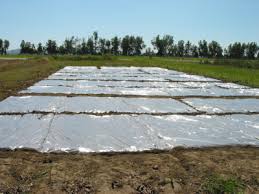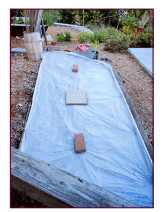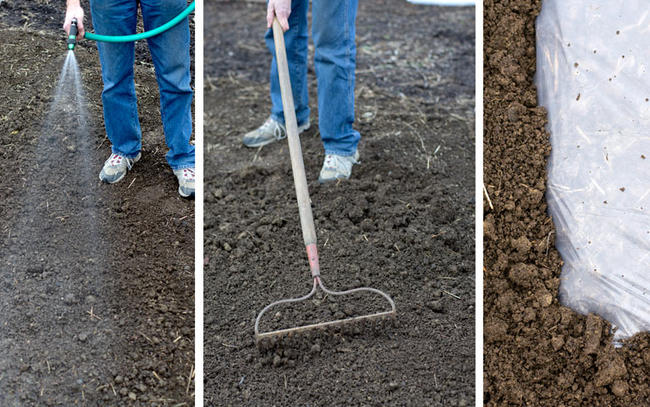Soil Solarization...The Natural way to Rejuvenate and Clear all WEEDS and FUNGUS in your Garden's Soil
The Sun's power is a force man has long tried to harness and put to use. Remember the fun you had as a kid experimenting with a magnify glass? Plants are magical in that they can harvest the sun's energy in the process of making food. We gardeners can also make use of the sun's powerful energy to help us in our gardening efforts. There is at least one good thing about this intolerable summer heat - you can put it to work for you by solarizing your garden soil. Therefore, soil solarization is best done during the middle of summer.

Raised beds, perennial beds, weed-infested fields, even slopes can be solarized to kill weeds, pests, and pathogens or fungus. Some fungus like Club Root can stay in your soil for 20 years if not treated, and who wants to use a chemical to treat the soil? NOT ME.

It is called Solarization, because it uses the heat of the sun’s rays to basically cook the plants, weed seeds, nematodes, insects, and soil pathogens (the “bad guy” fungi, bacteria, etc. that bring diseases to plants) in the uppermost layers of soil. Ah but It can also makes nutrients to plants later grown in solarized soil.
Summer is the best time of year for Soil Solarization. The air is warm, and, this is when the sun has its greatest heating potential. The entire process needs approximately 5-6 weeks of summer heat. The process is really quite simple.
First you have to clear the area of plants and weeds that are currently living in the area that you want to Solarize. If you want to make a garden area from your lawn then just leave the grass there as it is.

Next you want to make the soil surface level and smooth, so raking it would be helpful
Then you need to water the soil, to about a 12 inches deep, to ensure you get all the fungus and bacteria. By watering the soil it will increase it's heat conductivity.
Finally you want to lay a clear plastic sheeting over the area. 1-4 mil plastic is perfect, you can get at any painting store, comes in a roll which makes it easier to lay out properly. You want to ensure that the plastic is as close to the soil as possible. Anchor the corners and the edges either with lumber, or rocks or soil to ensure it stays in place. Leave it in place for 4-5 weeks.
There you have it folks. Fresh soil.
Happy Trails
Image Sources:
https://www.rodalesorganiclife.com/garden/soil-solarization
https://www.pinterest.com/pin/56998751511769002/
http://www.faculty.ucr.edu/~atploeg/Ploegweblinks/Solarization.html
An excellent post. This is a technique i learnt about in University. Its so useful and needs to be more widely known and practiced.
you can also mix in your composts and biochar before solarising as they assist the process by holding moisture, making the soil darker and absorb heat better and they support the beneficial microbes
resteemed and sent to various groups on facebook
Thank you for the vote and the Re-steem, now following. I agree with mixing composts to achieve the same effect, but I feel that compost can attract pests and disease or fungus if not fully broken down, so that would be a risk, in a small way. Thanks again.
Thanks for sharing this info, not a bad idea to do if one needed to. I like that the sun does the work instead of pesticides.
exactly, there are enough chemicals in this world around us already. Thanks
wish I had soil LoL , I live in Reno Nv. it's the bottom of a prehistoric ocean . We really have to truck it in or ware out a digging bar . Thats why I'm building an Aquaponic system . Would ask but you've been up voted and resteemed
Best practice. I use black plastic for all growing times. My garden spots are covered in snow until beginning of march. As soon as the soil is not frozen I put out my drip irrigation and then cover with the black plastic which I then plant thru in holes I cut around each emitter. It is a good bit of work to begin with, but I have next to no weeds all year long in my growing rows. Plastic mulch/ground cover is the best for weed control . It heats the soil in early season, retains moisture in summer heat, keeps weeds at bay, then keeps soil warm in fall.
Thank you. Yes I absolutely agree with the mulch as a weed control, but that can present a few problems too, like it can bring pests to your garden, or attract pest that otherwise would not have found their way. Also diseases too. Now I am not saying always but some can.
There are definitely drawbacks to most every means of weed control. Each one comes with its own unique challenges and must be evaluated for the appropriateness of the space it is to be used.
My soil is super porous as the water table is only 10ft down, I don't get any standing water, so plastic works really well for me. Others that don't have super draining soil will have more problems with moisture/fungus/diseases than I do for sure.
Yes it is indeed. Real estate on any homestead is a priority space. I put sand mixed with my compost and then add to my soil. It seems to work well for drainage. Thanks
Rad! Never thought to do this. I'll have to see if there are any good areas of my yard to try it. Following! Great posts
Thank you
BAM!! That's AWESOME!!! Thank YOU!!!
Thanks for this @gardengirlcanada. I've never come across this before.
Is there any risk that beneficial creatures like earthworms will be killed in the process as well?
Good question. Will ask my senior gardener, and let ya know.
I lift up my plastic and there are TONS of worms! Anywhere in my garden I can find plenty of worms. During tte heat of the day they tend to go a bit deeper to the cooler soil but the other 12 - 16 hours they are all near the surface.
It definitely also kills some beneficial fungi & micro organisms. After using this method, I would put down compost or compost teas and do a mycorrhizae & effective microorganism soak to bring the life back. :)
Thank you for the tip.
Is this something you'd do annually? What about climates where snow falls? Do I need to give up my prime growing season?
No you don't do this annually. if you see that your crop or plants are suffering from fungus and bacteria, then yes it is highly suggested, but if you are just dealing with pests then there are plenty of ways to combat pests naturally, without losing your growing season on the real estate of your garden. Also you do not have to solarize your entire garden, just the area that has fungus problems. I will be doing a post tomorrow about the different fungus and bacteria and how to recognize them on your crops. stay tuned my garden friend
Good deal. Thanks.
wow very interesting! thanks for sharing!
We haven't heard of this technique before. Thanks for the tip. :)